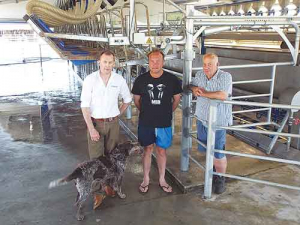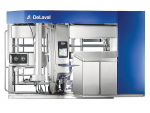Warren Lund and son Daniel milk about 400 cows on 110ha at Pokuru, near Te Awamutu.
Until early 2017 they used a 40-year-old 32-bail rotary that was showing its age.
Deciding to upgrade they thought rotary was still the way to go, but the more working examples they saw, the more they became concerned about husbandry -- finding cows were not being milked out properly and many with blind quarters from chronic mastitis infections.
In a change of direction the Lunds installed a DeLaval P2100 parlour with rapid entry/exit configuration for excellent flow through the shed; more importantly it allows the operator to be ‘closer’ to the cows and do a better job.
Housed in a purpose-built, clearspan shed, the 24/24 herringbone is a good working environment in a wide, cushion-floored pit, has clear visibility of the cows arriving, being milked and departing, and is a clean place to work.
Daniel Lund says “we now don’t bother to wear a milking apron, it’s so clean”.
Cows entering the parlour are guided to individual milking stalls where moveable index rails nudge them into the correct position -- square-on to the milking cluster positions. Operators are kept clean by a novel butt pan system that collects effluent which is flushed away periodically.
Overhead lighting aids visibility, and udder lights illuminate the business end of the cows.
The milking plant has a low line layout that helps reduce vacuum levels, reducing stress on the cows and damage to teats.
High-level automation identifies individual cows and tracks yield measurement, and automatically drafts cows (or allows manual drafting) for mating or vet inspection; milk is analysed for blood, and conductivity testing gives early warning of sub-clinical mastitis.
After milking, the rapid-exit stalls (with meal feeding bins) lift to allow animals to move away quickly, helping keep productivity up; and an automated deck flushing clears the floor of the stall for the next cows.
After exiting, the cows move through a race where they get teat sprayed, weighed and pass through a foot-bath, or they are sent for inspection.
Milking 400 cows in about 100 minutes, the system meets expectations, says Warren Lund.
“It is easy for operators and animals and, more importantly, it allows high throughput and the ability to look at cows individually, which helps us to maintain high standards of husbandry.”
Making life easy
DeLaval says its P2100 is designed for fast, efficient milking: walking distances are short, milking is fast and changes are quick from one group to the next.
The compact design also helps to minimise building costs.
Safety features include a gutter for kick protection, butt pan and ‘sensible’ pit edge design.
Cows easily enter the milking place and hold a comfortable, natural position during milking. Air-actuated indexing systems smoothly control milking parlour entry and exit.
Automation options can suit milking needs and budget. Other options include a carrier rail and udder spotlights. Smooth surfaces on optional stainless steel upper cabinets and curb cabinets, on light cabinets and pit edges, enable rapid cleaning.


















